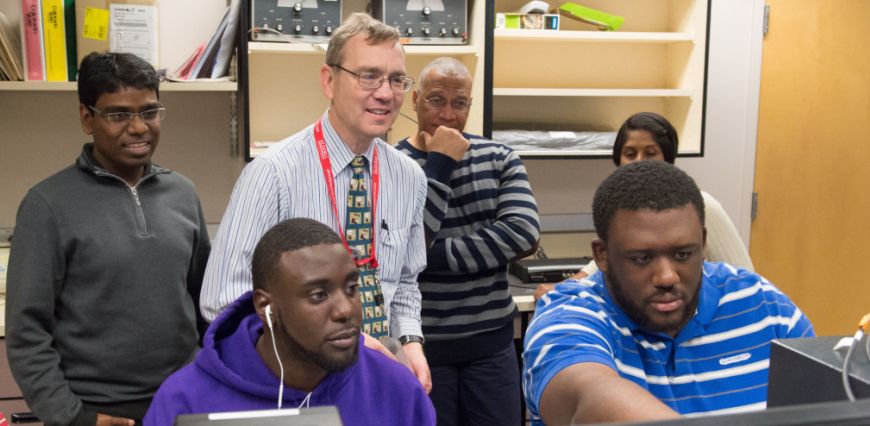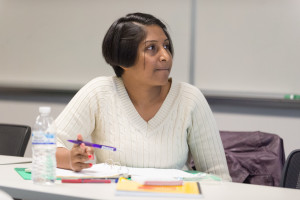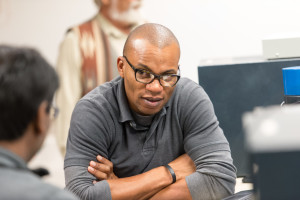
CSU’s Tom Johnson (center) talks neutron detection with Alcorn State University students and assistant professor Jermiah Billa (left). Credit: John Eisele/Colorado State University
Tom McLean’s PowerPoint presentation on neutron detection was labelled “unclassified” but students from Alcorn State University might one day end up in a classified government job, if all goes as planned.
A handful of students from the Mississippi land-grant institution — a historically black college — recently spent several days on the CSU campus learning about neutron detection from McLean and Tom Voss, health physicists at Los Alamos National Laboratory in New Mexico, and Tom Johnson, associate professor, and Alex Brandl, assistant professor, in the Department of Environmental & Radiological Health Sciences in the CSU College of Veterinary Medicine and Biomedical Sciences.
The purpose? To provide students with hands-on training and access to lab equipment that they don’t have back home. The broader aim? To help prepare underrepresented students for a career in a federal laboratory.
“We do not have any exposure to neutron detection, which is very important for health physicists,” said Jermiah Billa, Alcorn State assistant professor and director of the school’s health physics program.
“It is hard to go to a national lab and conduct training for students because of the need for security clearance. We were able to close the gap in terms of what we need by working with Colorado State.” Billa first met CSU’s Johnson when he was in graduate school at Idaho State University. The CSU-Alcorn State partnership is in its early stages; last year, Johnson traveled to Mississippi and gave several lectures.
Hands-on training for health physicists is important
Johnson said this type of training is important for health physicists, so that they can measure the amount of radiation energy deposited within a human body.
“We need to measure the neutron dose to ensure we protect members of the public, the environment and workers,” he said. “By knowing this, we can make sure appropriate shielding or safety measures are taken, so that no one is exposed to too much radiation, and we and others can work safely.”
People are exposed to radiation as part of their work in a variety of places, including national laboratories, power plants, medical facilities and even oil fields.
In addition to lecture and lab experiences at CSU, the students and scientists traveled to Lakewood to visit the TRIGA nuclear reactor, the only facility of its kind in Colorado and one of just a handful of research reactors in the country.

Shimi Didla, a student and employee at Alcorn State University, described the experience as “priceless.”
“We’ve never seen a neutron source,” she said. “We don’t have neutron detectors and we didn’t know how an actual neutron spectrum would look. We got a whole semester’s worth of learning in three days.”
Didla said she hopes to land a job in radiological health sciences.

Ches Simpson, a scientist at Pacific Northwest National Laboratory in Washington state (and, previously, an employee at Los Alamos National Lab), said the ultimate goal of this training program and partnership is to employ more minority students at national labs.
“CSU has a great relationship with Los Alamos, because they’re in the same region, and Los Alamos has a need for health physicists, scientists and technicians,” Simpson said. “All Department of Energy national laboratories, including PNNL, have similar needs, and our goal is to create connections with minority students at universities across the country to fill open positions in all STEM fields.”
Alcorn State University and other historically black colleges and universities in the United States work with three national labs — Pacific Northwest, Los Alamos, and Y-12 National Security Complex — to strengthen this type of training. Funding for the program is provided by the U.S. Department of Energy’s National Nuclear Security Administration’s Minority Serving Institutions Partnership Program.